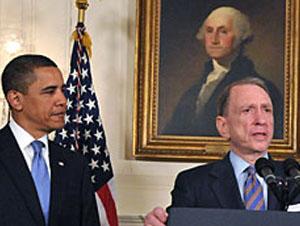Does one Senator make a political trend?
President Obama with Senator Arlen Specter (Image: To the Point)
The following is not a full transcript; for full story, listen to audio.
President Obama went to St. Louis, Missouri to mark his hundredth day in office. He reviewed his accomplishments and said it would take hard work to achieve the rest of his goals.
The President got a boost in that direction when Arlen Specter switched parties. Or did he? The Pennsylvania Senator drove a hard bargain, and skeptics say he’ll be no more reliable as a Democrat than he was as a Republican. But, while Specter might have been a Republican in name only, is he leaving a party that’s now so ideologically pure its nominees can’t win general elections?
President Obama: "I don’t expect that Senator Specter will agree with every decision I make, and support every single one of those policies. I don’t … expect Arlen to be a rubber stamp, I don’t expect any member of Congress to be a rubber stamp."
Dick Polman is Political writer for the "Philadelphia Inquirer." He thinks the Democrats are going to be just as frustrated with Specter as the Republicans were: "I think that philibuster-proof 60-seat threshold is a bit oversold … Senators are by nature pretty independent characters … and there certainly are conservative Democrats … and I think on an issue-by-issue basis he’s going to be one of them.
"On the other hand … there’s an interesting thing going on right now with him and Obama. Obama has pretty much at this point signaled that he supports Specter for the Democratic Senate Primary now in Pennsylvania next Spring, and there are other potential candidates — Democrats who want to run, one has already announced — and so in a way there’s an IOU thing here potentially where Specter might vote a little more Democratic … than we expect …"
"The Republicans are saying about Specter … good riddance because he wasn’t a true conservative, and so now we can sort of stand on our principles. The challenge for Republicans have nationally now, at least outside of the South and certain Midwestern areas, is how are they going to … frame these conservative principles as being sufficiently attractive to middle of the road swing voters and people in the middle of the political spectrum, who in the last few years basically decided that the conservative principles have not served their country well.
"And it’s a particular challenge, I think more than any, among younger voters. If you’re looking at the younger voters — under age 30 — and the turnout for Obama last fall; and it was not just a turnout for Obama … these were young people who grew up during the eight years of Bush and decided that that’s just not the party for them. Voting habits get locked in … and I think on issues like gay marriage and other social tolerance issues, Republicans have to find a way to somehow make their principles … attractive to voters like that."
Other guests:
Dick Polman: Political writer for the "Philadelphia Inquirer"
Ron Brownstein: National Political Reporter, "Los Angeles Times"
Tom Edsall: Political Editor, Huffington Post
Reihan Salam: Fellow, New America Foundation
Jon McHenry: Partner, Ayres, McHenry and Associates
Hosted by award-winning journalist Warren Olney, "To the Point" presents informative and thought-provoking discussion of major news stories — front-page issues that attract a savvy and serious news audience.
